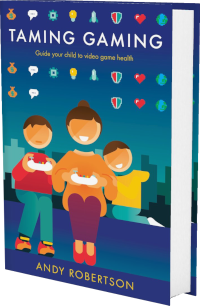 Android
Android iOS
iOS Mac
Mac Switch
Switch Wii
Wii Wii U
Wii U PC
PC PS4
PS4 PS5
PS5 Xbox One
Xbox One Xbox X|S
Xbox X|S17/06/2021 07:37:27 2 years ago Author: Andy Robertson
If video games invite children to new worlds that build character, sociability, well-being, intuition and intelligence then why do we read so many scary stories about them creating violent behaviour, being addictive, encouraging gambling or enabling unwanted interactions with strangers?
Along with any benefits, we need to face the challenges of video games honestly. The messy reality of family gaming is a long way from the pristine surfaces and sparkling smiles of hired talent in family gaming adverts. Left to their own devices, children tend towards playing for too long, getting frustrated, not stopping for mealtimes and arguing with siblings.
In the past, games were short, offline and expensive. This made them self-limiting. Many new games are infinite, online and free, and consequently have lower barriers to repeat-plays and more ways to cultivate avid players than other media do.
Add to this the World Health Organization’s (WHO) inclusion of ‘gaming disorder’ to their disease classifications, scary headlines about the effects of violent video games on children’s behaviour, in-game purchases that offer gambling-like transactions, and anonymous strangers in online game worlds, and it’s not surprising that video games are a hot topic for parents.
As the title of my Taming Gaming book suggests, video games can sometimes be problematic in the lives of children. As with many things they eagerly enjoy – sweets, football, television, sticker collecting and shopping, to name a few – we need to steer them in the right direction so that their hobby works with family life rather than against it.
However, because video games are a new medium, we don’t have the same level of understanding or first-hand experience to enable us to play this role as we do in other areas. Sifting through the conflicting newspaper articles and reports, school warnings and children’s charities’ advice is time-consuming and confusing. Along with developing our literacy about what games are, digging into the details of our worries (violence, addiction, gambling, online strangers)about gaming is essential if we are to offer children consistent guidance rather than knee-jerk reactions or short-term solutions.
Technology companies, governments and parents often point the finger at each other for not doing more to ensure these experiences are handled responsibly and healthily. The reality is that this is a shared responsibility.
While government legislation and self-regulation need to continue to improve, and industry must be more open with player data and enhance parental controls, we as parents need to capitalise on the tools and laws already in place: PEGI and ESRB age ratings; automatic limits based on these age ratings; detailed reports on how long children are playing for; automatic ways to set daily time limits, spending boundaries and restrictions to online interactions.
Along with this, it’s important to debunk misrepresented and misreported science. The fears evoked from such articles can drive reactionary bans and limits where parents further distance themselves from this area of their child’s life. If we are going to worry about video games, let’s worry about the right things and in a way that engages us with our children.
As Andrew Przybylski said in his Oxford Internet Institute London Lecture, ‘we need to abandon the idea of screen time because it’s sucking all of the oxygen out of the room for more meaningful questions. We need to be able to ask more meaningful questions to have the faintest hope of turning this around.’
Andy Phippen, Professor of Digital Rights at Bournemouth University, and research scientist Maggie Brennan suggest the direction for these questions in their book Child Protection and Safeguarding Technologies. . They say the UN Convention on the Rights of the Child ‘should be any policy maker’s go-to for the development of new resources, technologies, policy, or legislation.’
They suggest that we move from worrying about whether content is either safe or harmful and instead focus on the things that young people say upset them: people’s online behaviour, real news stories, online bullying and rudeness. They distil this into how young people say they want parents and carers to help: ‘Listen, don’t judge, and understand.’
Rather than worrying about screen time, violence, spending and online strangers in a way that distances us, let’s worry instead whether we are listening well to our children’s gaming, let’s worry if we are too quickly judging why they are playing so much, let’s worry if we are accurately understanding the role games are playing in their lives.
Avoid letting video games become an area of your child’s life that you’re not involved in. Make use of the comprehensive tools on consoles and gaming devices to set boundaries and gain deeper understanding of risks. Actively watch children play and talk to them about their games, play with them and, best of all, find games to play yourself.
Treat video games like other areas of childhood. There are dangers in most things that children benefit from – riding a bike, baking a cake, going to a theme park, playing in the sea, climbing trees – but that shouldn’t eclipse their value.
My son used to be terrible at crossing the road. He wouldn’t properly check both ways. He’d choose to cross between parked cars. He’d get distracted by friends on the other side. He was a government safety advert waiting to happen. I’m making light of it, but it was actually pretty scary. We instigated a rule that he wasn’t allowed to cross on his own unless he was holding either my wife’s hand or mine. But, of course, this road crossing ban only got us so far. We spent time with him crossing together so he could learn how to do this safely. One day we wouldn’t be there to hold his hand. Worse, he would be with friends and other distractions.
We could have decided to never let him cross a road on his own by making sure he saw roads as being as too dangerous to approach. That is technically possible, but my son wouldn’t have thanked us when he saw his friends happily navigating busy carriageways. We could have limited his road-time to a few minutes a day, but that would have been just as bonkers. He could still get into plenty of trouble in a few minutes.
Like roads, video games are an unavoidable, normal and important part of the world our children are growing up in. They can both take them to all sorts of wonderful new places, provided they have the right guidance; like any powerful and beneficial aspect of life, there are dangers.
As children grow older and move from road-crossing to becoming road-users, it’s tempting to build and police roadblocks to limit their travel and make things safer. In extreme cases, we might even think about closing this gaming road altogether.
What they really need, though, is parents and carers to join them on their journey, whether it’s just an enjoyable leisure activity, a way to extend playground friendships, to gain a sense of connection missing in other parts of life or maybe to cope with stress or deal with anxiety. On the road together – playing with them – we have a really good chance of finding out what’s going on.
It can seem that these worries are easy to solve. ‘If you’re worried about video games’ effects on children, why not just keep them out of the house?’ However, this is a misunderstanding both of what video games are and the place they hold in a child’s life.
Video games are not a problem that needs solving any more than learning to share with siblings, the first day at school, teenage heartbreak or leaving home for university. What’s needed, as with these other aspects of growing up, is guidance and support so that children grow through all of these challenges in preparation for the reality of their future lives. In fact, overly protecting them from these hardships or dangers can stunt their future maturity in these areas.
Those common suggestions and headlines often taunt us with what ifs about video games. What if video games become uncontrollable? What if we lose our child to them? What if they grow into addicted adults? What if they become violent at school? Perry has good advice for parents worried that children won’t grow out of strange eating or sleeping habits, that is also helpful on their latest odd video game obsession. “Believe me,” she writes, “almost everything with children is a phase. So it’s fine to go with what works in the present, however odd it seems.”
The family is a unique and powerful space for this work. It’s ‘the one anchor we can’t pull up’, as Shapiro puts it. Rather than minimising and keeping games at a distance, having them as part of family life not only makes them more enjoyable but creates conversations and critiques that equip children with the skills they need to make healthy decisions about the games they play and the affiliations, commitment and behaviour that go with that.
You can probably tell where this is heading – back to my crazy suggestion: to care for a child who loves video games we need to not only understand the games but play them ourselves and with our children.
This takes our video game literacy from theory into first-hand experience. It changes your role from protecting to parenting when it comes to your child’s gaming. Like other areas of childhood, we don’t need to overly worry when things go wrong. That’s one of the points of the family home. It’s where children experiment, push boundaries and learn from mistakes as well as successes.
It’s not easy. In fact, in the short term it feels like much harder work than simply forcing video games into submission. But every bit of this parenting work – all the heartache, each argument, every time you start again, the questions you listen to, each misunderstanding clarified and disagreement resolved – is making a difference to your child’s future. And as parents and carers, we can accommodate and hold this tension with a longer view in mind.
This isn’t about changing your family values but empowering you to implement them effectively. To use the terminology helpfully outlined in Sonia Livingstone’s Parenting for a Digital Future, parents’ and carers’ approach to games can be ‘embracing, balancing or resisting’. Each of these perspectives is completely valid. Equally, each of them benefits from parents playing video games with children and on their own.
We have children with us for a limited time. When they leave, we want them to be able to make good decisions without us. Rather than worrying about how much screen time your child is racking up, there are better questions to ask them about their gaming:
- Can they acknowledge how games affect their emotions?
- Can they structure their game time to maximise their enjoyment?
- Do they know when they’ve had enough?
- Do they treat other players with respect?
- Can they enjoy the game even if it doesn’t go well for them?
- Are they developing an appetite for a wide range of experiences?
- Can they make informed decisions about expense and value?
- Can they discuss the games they play with detailed and thought-through ideas?
- Can they happily compromise gaming time for family commitments?
- Do they share their gaming achievements and progress with you?
- Are they enthusiastic about playing games together as a family?
- Is their gaming integrated with a varied mix of other activities?
i This article was first published in the Taming Gaming book.
© 2024 Family Gaming Database












